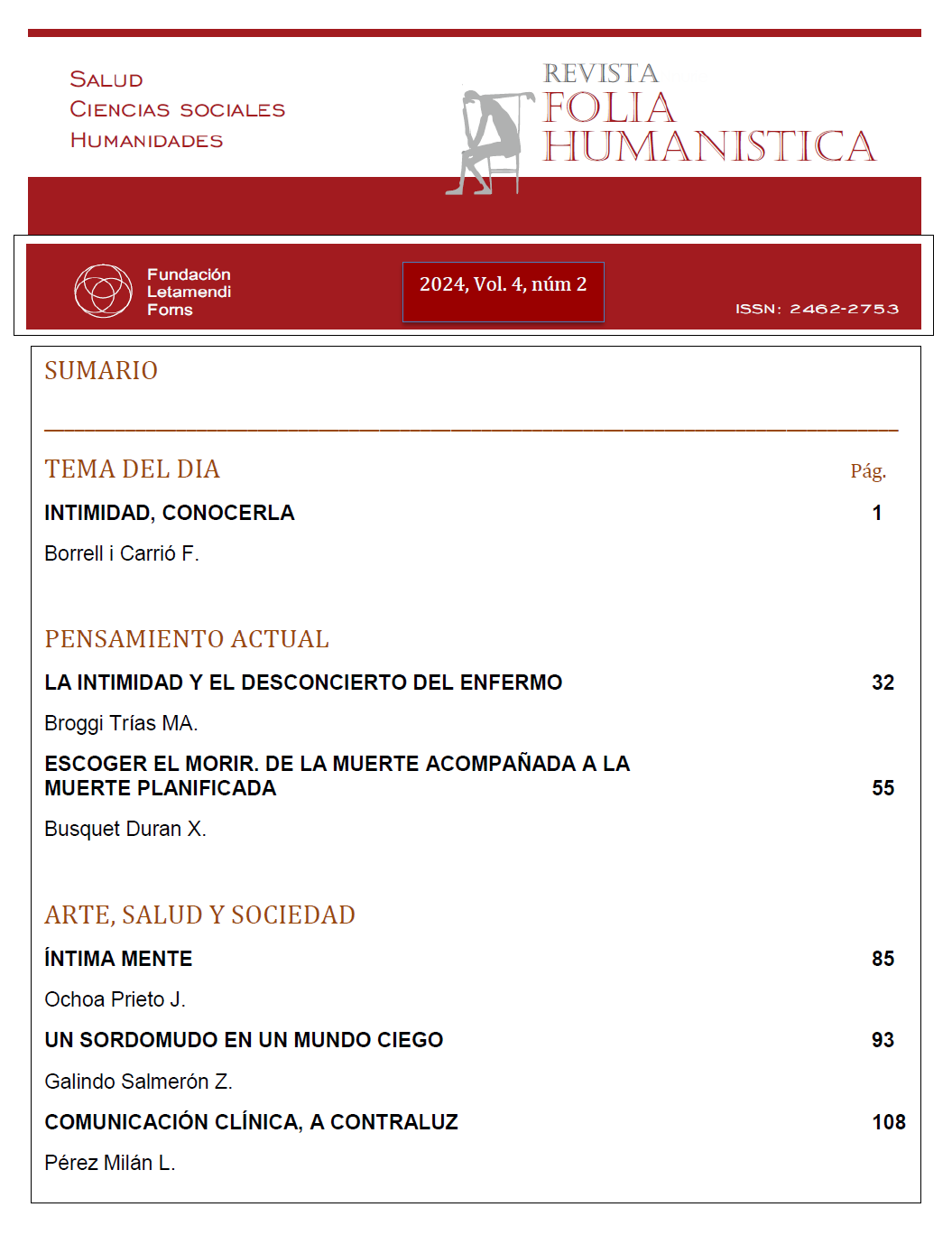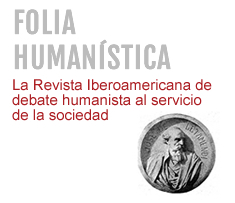Intimidad, conocerla
DOI:
https://doi.org/10.30860/0111Keywords:
Intimacy, Character, Emotional warp, Spontaneity, Courtesy, Cooperation, Egodystonia, Internal dialogue, PrivacyAbstract
Intimacy consists of three aspects: first, the emotional-sentimental warp, where the things of the world resonate and create us emotions and feelings, the raw materials of intimacy. This resonating with the world can be manifested (extimacy) or kept to ourselves (intimacy). This decision—whether to show or to keep for ourselves—is the second aspect. In a culture that idolises spontaneity, it would be difficult to mature as individuals. Modesty is not just reticence; it is an opportunity to develop and improve, a "resistance to becoming merely my body." The third aspect is that each person regulates relational spaces where greater or lesser spontaneity, sincerity, courtesy, modesty, and generosity are allowed. In conclusion: emotional sensitivity, personal space and social interaction weave a delicate fabric that covers and reveals us a narrative marked by the tension between what we are, what we want and believe to be, and how we show ourselves. When we are not at ease with ourselves (ego-dystonia), we try out new adaptations to the environment. But we can also become accustomed to discomfort, with the danger of social withdrawal and emotional stagnation.
References
Pániker S. Asimetrías. Barcelona: Kairós; 2016.
De la Peña A. ¿Por qué hay pocos jóvenes nudistas en plena era del postureo? La Vanguardia [Internet]. 14 de agosto de 2023 [consultado julio 2024]. Disponible en: https://www.lavanguardia.com/vivo/tendencias/20230814/9162943/faltan-jovenes-nudistas.html
De Waal F. El mono que llevamos dentro. Barcelona: Tusquets; 2024.
Damásio A. El error de Descartes: la emoción, la razón y el cerebro humano. Barcelona: Destino; 2011.
Gracia D. Construyendo valores. Madrid: Triacastela; 2013. Disponible en: https://campusvirtual.fundacionletamendi.com/
Rof Carballo J. Medicina y actividad creadora. Madrid: Revista de occidente; 1964.
Mosterín J. Los cristianos: historia del pensamiento. Madrid: Alianza Editorial; 2010. p. 144.
Bailey M, Blanchard R. Gender dysphoria is not one thing. 4th WaveNow [Internet]. 7 de diciembre de 2017 [consultado julio 2024]. Disponible en: https://4thwavenow.com/2017/12/07/gender-dysphoria-is-not-one-thing/
Mill S. El utilitarismo (1863). Madrid: Alianza Editorial; 2023.
Conill J. Intimidad corporal y persona humana. De Nietzsche a Ortega y Zubiri. Madrid: Tecnos; 2019.
Goffman E. Strategic Interaction. Nueva York: Ballantine Books; 1969.
Grice HP. Logic and conversation. En: Cole P and Morgan J. Studies in Syntax and Semantics III: Speech Acts. New York: Academic Press; 1975. pp. 183-98.
Horcas Villarreal JM. La Pragmática de la Cortesía. Contribuciones a las Ciencias Sociales [Internet]. Abril 2009. Disponible en: www.eumed.net/rev/cccss/04/jmhv3.htm
Buenafuente A, Rubianes P. Una conversación solamente [video en internet]. El Terrat. Barcelona; 2007 [consultado julio 2024]. Recuperado a partir de: https://youtu.be/J7J9g87MTLE?si=D5SWcBWg8w0xKaUs
Davis M, McKay M, Eshelman ER. Técnicas de autocontrol emocional. Barcelona: Martínez Roca; 1982. p. 101.
Torralba F. La intimidad. Lérida: Milenio Publicaciones SL; 2014.
Daine K, Hawton K, Singaravelu V, Stewart A, Simkin S, Montgomery P. The Power of the Web: A Systematic Review of Studies of the Influence of the Internet on Self-Harm and Suicide in Young People. PLoS One. 2013; 8(10): e77555. https://doi.org/10.1371/journal.pone.0077555
Marías J. Breve tratado de la ilusión. Madrid: Alianza Editorial; 2018.
Smith A. La teoría de los sentimientos morales (1759). Madrid: Alianza Editorial; 2022.
Breithaupt F. El cerebro narrativo: lo que nuestras neuronas cuentan. Madrid: Sexto Piso; 2023.
Ortega y Gasset J. Ensimismamiento y alteración (1939). Madrid: Alianza Editorial; 2016.
Carrère E. Yoga. Barcelona: Anagrama; 2021.
Kahnemann D, Diener E, Schwarz N. Well-Being: Foundations of Hedonic Psychology. Nueva York: Russell Sage Foundation; 1999.
Downloads
Published
How to Cite
Issue
Section
License
Copyright (c) 2024 prueba

This work is licensed under a Creative Commons Attribution-NonCommercial-ShareAlike 4.0 International License.
La Revista Folia Humanística se adhiere a Creative Common en la modalidad: Reconocimiento – NoComercial – CompartirIgual (by-nc-sa): No se permite un uso comercial de la obra original ni de las posibles obras derivadas, la distribución de las cuales se debe hacer con una licencia igual a la que regula la obra original.








